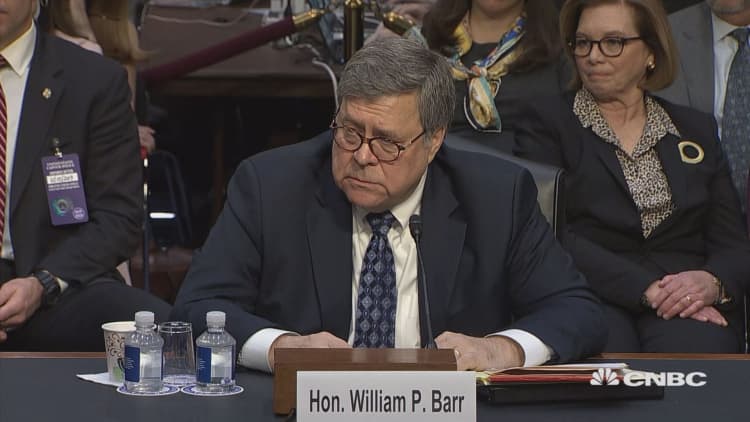President Donald Trump's nominee for attorney general, William Barr, was confirmed in the Senate on Thursday to take over the Justice Department, where he will oversee special counsel Robert Mueller's Russia probe.
Barr, 68, was confirmed in a 54-45 vote that largely fell along party lines. He was sworn in Thursday afternoon in the Oval Office by Supreme Court Chief Justice John Roberts, the White House told NBC News.
Barr was widely expected to be confirmed by the Republican-majority Senate on Thursday. He had served in the same role more than two decades earlier in President George H.W. Bush's administration, and had passed procedural hurdles in the Senate Judiciary Committee and the full Senate in recent votes.
A few senators broke with their party in the final vote, however. Among Democrats, Sens. Joe Manchin of West Virginia and Doug Jones of Alabama — both of whom represent deep-red states — voted for Barr, as did first-term Arizona Sen. Kyrsten Sinema. Kentucky Sen. Rand Paul was the only Republican to vote against Barr's nomination.

Barr, a Justice Department veteran, came under heavy scrutiny during his confirmation process. Democrats in particular grilled Barr during congressional testimony about how he would handle Mueller's ongoing probe of Russia's election interference and possible collusion with Trump campaign-related officials.
Barr's rise to become the No. 1 law enforcement official in the country would also give him the responsibility to oversee Mueller's investigation. The previous permanent attorney general, Jeff Sessions, recused himself from the government's Russia probes in March 2017 following reports about his contacts with Russia's then-ambassador to the U.S.
Oversight duties fell to Deputy Attorney General Rod Rosenstein — a circumstance that vexed Trump, who viciously and publicly criticized Sessions' over his recusal until the beleaguered Sessions left the administration in November.
Trump selected Matthew Whitaker, a former U.S. attorney in Iowa, to fill the role in an acting capacity following Sessions' departure. He inherited oversight duties in the Mueller probe, which alarmed Democrats and other critics who were skeptical of his past comments about it. For instance, Whitaker notably argued in an August 2017 op-ed for CNN that Mueller's investigation is "dangerously close to crossing" the so-called red line not to look into the Trump family's finances.

Barr, in contrast, has said that he considers Mueller a friend, and vowed to make the conclusions of the special counsel's probe as public as he could manage. He even pushed back on Trump's oft-repeated characterization of the Russia investigation as a "witch hunt" during his testimony before the Senate Judiciary Committee in mid-January.
"I don't believe Mr. Mueller would be involved in a witch hunt," Barr told Senate Judiciary Chairman Lindsey Graham, R-S.C., when asked directly in his committee hearing.
That wasn't enough to assuage some Democrats' concerns about the fate of the special counsel investigation in Barr's hands.
"Despite repeated questions and follow-up letters he failed to respond to, Bill Barr refused to commit to allowing the American people to see the full report submitted to him by Special Counsel Mueller," said Sen. Dianne Feinstein, D-Calif., the Judiciary Committee's top Democrat. "I consider that disqualifying."
Still, she added, "While I opposed Bill Barr's nomination, it's my hope that he'll remember he is the people's lawyer, not the president's lawyer."


